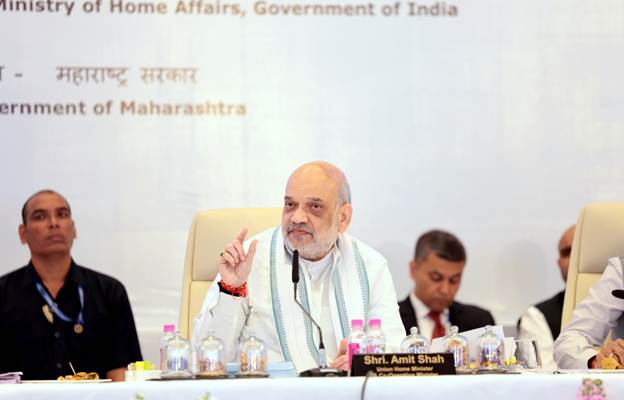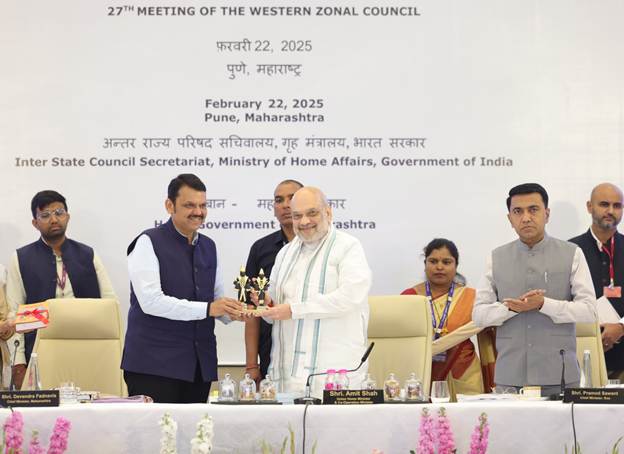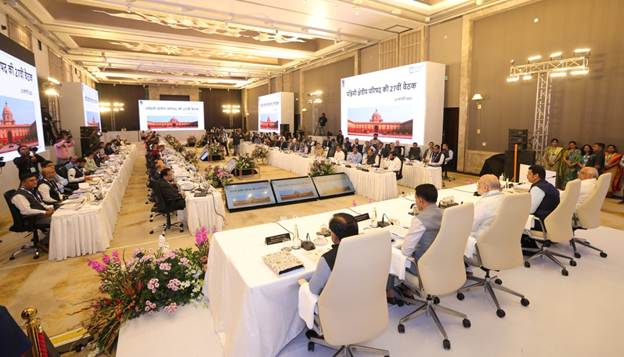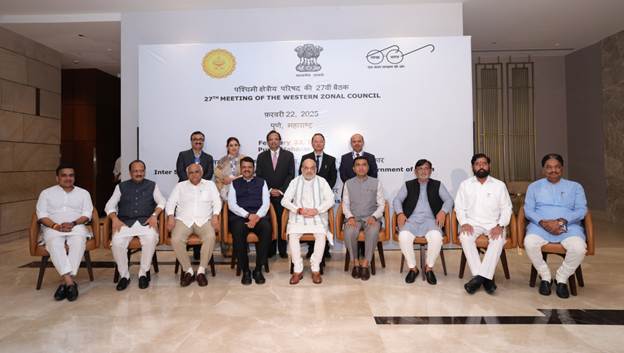Ministry of Home Affairs
Union Home Minister and Minister of Cooperation, Shri Amit Shah, chairs 27th meeting of the Western Zonal Council in Pune, Maharashtra
Prime Minister Shri Narendra Modi's Whole of Government approach is not just a mantra but a culture
In the Modi government, Zonal Councils have been established as a strategic decision-making platform, surpassing their traditional role as formal institutions
The government's goal is to ensure bank branches or postal banking facilities are available within a three-kilometer radius in every village across the country
Home Minister urges states to take the issues of malnutrition and stunting in children very seriously and implement all possible measures to address them
All states should launch a large-scale awareness campaign to connect farmers with the app designed to facilitate the sale of pulses to the Government of India at MSP
Topics of digital infrastructure and cyber crime will also be included in the purview of the Inter State Council
Posted On:
22 FEB 2025 6:53PM by PIB Delhi
Union Home Minister and Minister of Cooperation, Shri Amit Shah, chaired the 27th meeting of the Western Zonal Council in Pune, Maharashtra today. The meeting was attended by several dignitaries including Chief Ministers of Maharashtra, Gujarat and Goa, Administrator of Dadra and Nagar Haveli and Daman and Diu and Deputy Chief Minister of Maharashtra. The Union Home Secretary, Secretary, Inter State Council Secretariat, Secretary, Ministry of Cooperation, Chief Secretaries of States of Western Region, and other senior officials of State and Union Ministries and Departments also attended the meeting.

In his address, Shri Amit Shah stated that while the role of zonal councils are advisory in nature, in recent years, these meetings have evolved into a platform for sharing best practices adopted by various states and showcasing significant national-level achievements. He emphasized that through zonal council meetings, the country has successfully fostered inclusive solutions and holistic development, driven by dialogue, engagement, and collaboration.
Union Home Minister and Minister of Cooperation said that Prime Minister Shri Narendra Modi’s Whole of Government approach has transformed from a mantra into a guiding culture. He emphasized that the Zonal Councils have been established as a strategic decision-making platform, surpassing their traditional role as a formal institutions. Through this platform, several significant and transformative decisions have been made, particularly in the meetings of the Eastern Zonal Council. He further highlighted that these meetings have facilitated the exchange of innovative solutions and efforts to resolve long-standing issues in a comprehensive and integrated manner.
The Home Minister emphasized the Western region's critical role in the country's economy, noting that it accounts for more than half of India’s trade with the world. He highlighted that the Northern and Central regions also rely on the Western region for global trade. Shri Amit Shah pointed out that key infrastructure, including ports and urban development facilities in the Western region, serves not only its states but also others like Jammu & Kashmir, Madhya Pradesh, and Rajasthan. He further stated that the Western region contributes 25% to the nation's Gross Domestic Product (GDP) and is home to industries where 80 to 90% of operations take place. Given its economic significance, he described the Western region as a benchmark for balanced and holistic development across the country.

Shri Amit Shah underlined that since Shri Narendra Modi became Prime Minister in 2014, the Zonal Councils have evolved from mere formal institutions into dynamic platforms driving meaningful change. He highlighted a significant increase in their activity, noting that from 2004 to 2014, only 25 meetings were held, whereas from 2014 to February 2025, despite the challenges posed by the Covid-19 pandemic, a total of 61 meetings took place—an increase of 140%. Similarly, he pointed out that while 469 topics were discussed between 2004 and 2014, the number rose to 1,541 from 2014 to February 2025, reflecting a 170% surge. In terms of issue resolution, only 448 cases were settled in the earlier decade, compared to 1,280 in the last ten years.
Shri Amit Shah said that the government is steadily moving towards achieving 100% targets in subject areas mentioned in the puview of Zonal Council meetings. He highlighted significant progress in expanding financial access, noting that the goal of establishing bank branches or postal banking facilities within 05 kilometers of every village has almost been accomplished. In today's meeting, a new target was set to further reduce this distance to 03 kilometers, ensuring even greater accessibility. He emphasized that this achievement, made possible through the cooperation of all states, is a significant milestone and a source of collective satisfaction.
Shri Amit Shah acknowledged that the states in the western zone are among the most prosperous in the country. However, he expressed concern over the prevalence of Malnutrition and Stunting among children and citizens in these states. He urged the Chief Ministers, Ministers, and Chief Secretaries of the western zone to prioritize eliminating malnutrition to improve overall health. He emphasized that good health is not solely dependent on medicines and hospitals; rather, efforts should be made to ensure that children and citizens do not require them in the first place. The Home Minister stressed the need for serious attention to the problem of stunting in children and called for all possible measures to resolve it. Additionally, he highlighted the importance of reducing school dropout rates and enhancing the quality of education.
Union Home Minister expressed concern over the import of pulses and emphasized the need to boost domestic production. He noted that while farmers previously faced difficulties in getting fair prices for pulses, the government has now developed a mobile app that enables the direct purchase of 100% of their produce at the Minimum Support Price (MSP). He urged the western states to actively promote this app and encourage farmer registrations, ensuring fair pricing and contributing to the country’s self-sufficiency in pulse production.
Highlighting Prime Minister Shri Narendra Modi's vision of 'Sahkar se Samriddhi', Shri Amit Shah emphasized that cooperation is the key to achieving 100% employment in the country. He stressed the importance of strengthening Primary Agricultural Credit Societies (PACS), making them multi-dimensional, and effectively implementing more than 56 initiatives designed to realize the full potential of 'Sahkar se Samriddhi'. He urged Maharashtra, Gujarat, and Goa to take all necessary steps to build a robust cooperative infrastructure at the grassroots level.
Referring to the implementation of three new criminal laws, the Union Home Minister emphasized that it is now time to ensure that citizens receive 100% of the constitutional rights granted to them. He further stated that in the coming days, issues related to digital infrastructure and cybercrime will also be brought under the purview of the Inter State Council. He urged the states to proactively prepare for these developments.
Shri Amit Shah emphasized the importance of leveraging current efforts and a well-defined roadmap to drive the long-term economic development of both the country and individual states. He stressed the need to maximize growth potential by utilizing the strategic platform of regional councils to achieve 100% development objectives.

A total of 18 issues were discussed in the 27th meeting of the Western Zonal Council. In the meeting, some important issues related to the member states and the country as a whole was discussed in detail. These include land transfer, mining, speedy investigation of rape cases against women and children, implementation of Fast Track Special Courts (FTSC) scheme for speedy disposal of rape and POCSO Act cases, implementation of Emergency Response Support System (ERSS-112), bank branches/postal banking facility in every village, issues related to railway project and food security norms etc.
Apart from these, 6 issues of national importance were also discussed, which include - urban master plan and affordable housing, electricity operation/supply, eliminating malnutrition in children through Poshan Abhiyan, reducing drop-out rate of school children, participation of government hospitals in Ayushman Bharat-Pradhan Mantri Jan Arogya Yojana, strengthening Primary Agricultural Credit Societies (PACS). Best practices adopted by Member States/UTs were also shared in the meeting.

In his address during the meeting, Union Home Minister and Minister of Cooperation described Pune as the cultural capital not just of Maharashtra but of the entire country. He highlighted Pune’s historical significance, noting that Chhatrapati Shivaji Maharaj, the great Peshwas, and Lokmanya Bal Gangadhar Tilak played pivotal roles in shaping the nation’s direction across various fields. He also expressed gratitude to Maharashtra’s Chief Minister, Shri Devendra Fadnavis, for successfully organizing the meeting and ensuring excellent arrangements.
*****
RK/VV/PR/PS
(Release ID: 2105532)
Visitor Counter : 779